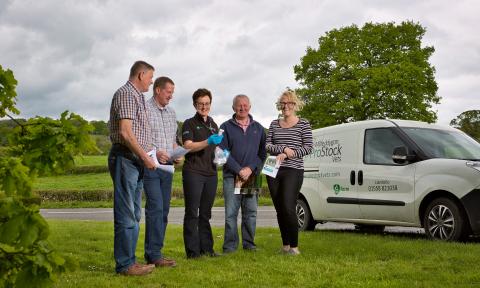10 June 2019
As many sheep farmers know to their cost, the economic and welfare implications of failing to control and treat internal and external parasites affecting their flocks can be catastrophic.
For farmer Eurwyn Lewis from Cilycwm near Llandovery, who recently attended a ‘sheep parasite control’ workshop, a series of fully funded animal health and welfare training events, delivered by Farming Connect in collaboration with rural vets throughout Wales, learning when and how to administer wormer medicines has been hugely beneficial.
“The key message I picked up from the Llandeilo workshop delivered by Cath Tudor and Merfyn Evans of Prostock Vets, was that if farmers routinely drench at the start of the warm weather, as many of us have always done in the past, we risk not only wasting money and time, but by administering drench when it may not be needed, we are also building up the resistance of worms that affect our sheep, making wormer drenches less effective in future.”
Vet Cath Tudor urged farmers everywhere to arrange to sample and test faecal matter at appropriate times as part of the flock health plan, saying that if a faecal egg count proves negative, you then don’t need to spend time or money on drenching.
“These workshops help farmers understand the need to preserve anthelmintic effectiveness and to appreciate the importance of parasite forecasting and faecal egg counting to ensure correct and timely application of working/ectoparasite treatments,” said Ms.Tudor.
Bethan Jones of Rhoshill, near Cardigan, is relatively new to sheep farming as she and her husband have a dairying background.
“I’m really glad I attended the workshop because although we only have around 50 ewes and are still learning a lot, the advice is the same whether you have 50 or 500 sheep and we want to ensure the highest standards of husbandry for all our stock.”
“I found it really useful to have so much advice from both Cath Tudor and her colleague Merfyn Evans, and one of the most valuable things I learned was that it’s just as important to know what ‘not’ to do as to what you should do – so seeking early veterinary advice is essential.
Each of the workshops also addressed the basic life cycle of roundworms and blowfly in relation to sheep production; gave advice on recognising the clinical signs of roundworm infection and blowfly strike and gave guidance on taking appropriate action to minimise the number of sheep that become clinically affected.
Cath Tudor concluded the workshop presentations by recommending that all farmers consult their own vet on management practices and isolation protocols to avoid introducing drug resistant worms and also advised all farmers to consult them on putting a robust parasite control plan in place.
Eligible farmers registered with Farming Connect can apply to attend a fully-funded animal health workshop on a wide range of sector-specific topics. Additional funding may be available for any necessary sampling, testing and feedback from your own vet. Contact your local Farming Connect development officer or click here for further information.
Both Farming Connect and the Animal Health and Welfare training programme have received funding through the Welsh Government Rural Communities - Rural Development Programme 2014-2020, which is funded by the European Agricultural Fund for Rural Development and the Welsh Government.
Menter a Busnes and Lantra Wales deliver Farming Connect on behalf of the Welsh Government. Lantra Wales leads on the delivery of the Animal Health and Welfare training programme, which is a call-off contract for the Farming Connect Lifelong Learning and Development Programme.

